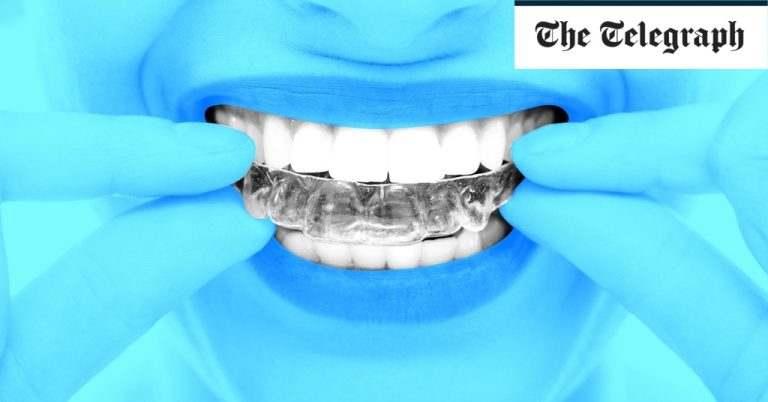Not surprisingly, orthodontists are skeptical about this. “They might work on a 21-year-old with healthy teeth,” says Dr. Al-Asady, “but it would be dangerous for anyone else, as you have to consider things like periodontal problems.”
I am three months and 11 aligners (out of 24) into my treatment and my teeth, especially the bottom ones, are noticeably less crowded. I can floss between them with ease, my gums have stopped bleeding and the dentist was less horrible than usual at a recent cleaning and polishing.
Most of the time I forget I’m wearing them. But I hated them at first – my jaw hurt and I couldn’t pronounce the letter S. You have to take them out every time you eat or drink anything but water and then brush your teeth before clicking them back in. mouth both dry and full of bubbly.
Adding the pieces or attachments, a month after the treatment, was unpleasant and rubbed so much that my mouth was full of sores. Every five days I have to scan my teeth at home using a kind of virtual reality headset attached to a mouth guard.
If my teeth “go through”, I move on to the next aligner. If they don’t, I get a message telling me to make sure I wear the liners for the recommended 22 hours a day and rescan later. Technology has made orthodontics easier and more discreet, but what happened to the famous British acceptance of bad teeth?
Just look at Austin Powers or The Simpsons dentist scaring children by brandishing the Big Book of British Smiles. Why do I and so many of my acquaintances feel the need to enhance our canines, even though none of us live by their looks?
Recent research by the British Orthodontic Society attributes the increase in demand for adult treatment to increased awareness of adult orthodontics, rising patient expectations, social factors and the rise of online work. For my sister-in-law Charlotte, lockdown Zoom calls were the trigger.
“I looked at myself all day and every day and every flaw magnified, but my teeth were what popped out. They seemed to be getting worse before my eyes.” Dr Al-Asady agrees: “We had a big rush after lockdown as people started to notice how crooked their bottom teeth were – when you smile you only see the top, but on Zoom you see the whole mouth.”
It also mentions how social media and selfies give us instant feedback on how we look. My friend Clare thinks the level of what’s acceptable is changing: “It’s like how Botox makes normal aging skin invisible, so Invisalign means we feel more pressure to improve our teeth.
Mine has always been good but they started receding – I didn’t do it to look younger, I did it to not look older or at least to stop the acceleration of aging. It was like Pilates for teeth.”
I was never particularly bothered by my teeth – the top ones were more or less fine and although the bottom ones looked like a filled graveyard, I assumed no one noticed. But seeing other people’s much better teeth made me feel self-conscious. I started smiling less often or putting my hand to my mouth.
It wasn’t that I was lusting after those huge shiny slabs of veneer worn by Liverpool manager Jurgen Klopp or the stars of Love Island. I wanted better versions of my own teeth, small and yellowed though they may be.
Over the past decade, I’ve also spent many hours at the orthodontist who gets my three children NHS and privately funded braces, after which they turned up with megawatt smiles. The waiting room is filled with dramatic before and after photos of other people’s smiles, and I was debating whether I should join them.
The final push came from my dentist, who told me that my ongoing gum problems could be alleviated with straighter teeth. It is this intersection of health and vanity that explains the appeal of Invisalign.
There are more than cosmetic benefits to straightening your teeth – better oral hygiene, less grinding and tooth decay, prevention of eating problems in old age – so you can convince yourself it’s not a monstrous act of self-care. a more acceptable vanity than botox or liposuction.
As Dr Rhona puts it: “As people get older they want to spend money to look better, but they don’t want cosmetic surgery or a facelift.” At least I hope so.
Mind you, I’m already planning to whiten my straightened teeth.

